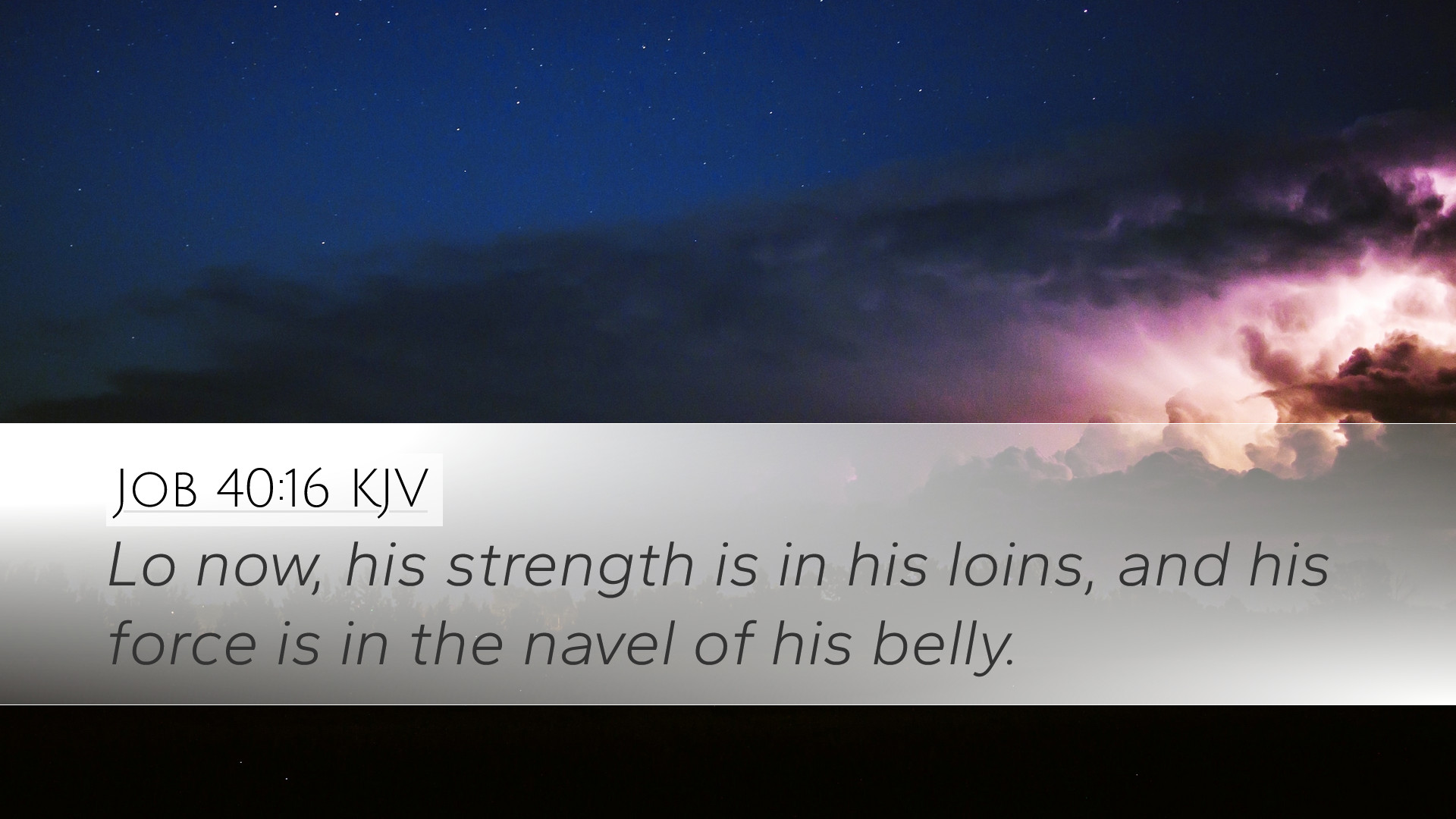Old Testament
Genesis Exodus Leviticus Numbers Deuteronomy Joshua Judges Ruth 1 Samuel 2 Samuel 1 Kings 2 Kings 1 Chronicles 2 Chronicles Ezra Nehemiah Esther Job Psalms Proverbs Ecclesiastes Song of Solomon Isaiah Jeremiah Lamentations Ezekiel Daniel Hosea Joel Amos Obadiah Jonah Micah Nahum Habakkuk Zephaniah Haggai Zechariah MalachiJob 40:16
Job 40:16 KJV
Lo now, his strength is in his loins, and his force is in the navel of his belly.
Job 40:16 Bible Commentary
Commentary on Job 40:16
Text of Job 40:16 (ESV): "Behold, Behemoth, which I made as I made you; he eats grass like an ox."
Introduction
The book of Job presents a profound exploration of suffering, divine sovereignty, and human understanding. Job 40:16 is part of God's response to Job, transitioning the discourse from human lamentation to divine revelation. In this verse, God introduces the creature known as Behemoth, inviting Job to observe it and to consider the majesty of its creation as a reflection of God's own power and wisdom.
Exegesis of Job 40:16
This verse is integral to understanding God's challenge to Job, highlighting several key themes: the nature of creation, the sovereignty of God, and the limits of human understanding.
The Complexity of Behemoth
Commentators have varied in their interpretations of "Behemoth." Matthew Henry notes that Behemoth is "one of the grand creatures of the earth," symbolizing the power and majesty of God's creation. He emphasizes that God's question to Job serves to remind him of the limits of human knowledge in contrast to divine omnipotence.
Albert Barnes, in his commentary, proposes that Behemoth may represent a hippopotamus or possibly an elephant, emphasizing its size and strength. He underscores the idea that God created such vast creatures, capable of living and thriving in their environment, thus contrasting Job's limited understanding of his own situation with the grand design of God in creation.
Adam Clarke similarly reflects on the nature of Behemoth as an embodiment of God's creative power, noting that its massive form and lifestyle serve as a display of divine creativity. He points out that Behemoth’s diet—eating grass like an ox—illustrates God’s provision for all creatures, reinforcing the interconnectedness of life and the sustenance offered by the Creator.
Theological Implications
This verse raises significant theological reflections regarding God's relationship with creation. It suggests that every aspect of the universe is under God's jurisdiction and care. The mention of Behemoth implies a deeper meditation on the themes of strength, resilience, and God’s providential care even in the largest and most seemingly untamable aspects of nature.
1. Divine Sovereignty
This passage illustrates God’s sovereignty over creation. God creates and sustains earthly creatures, which serves as a reminder of His ultimate authority. The very existence of Behemoth invites Job to testify to the greatness of God who governs all, even when human circumstances seem dire. Matthew Henry emphasizes that as Job contemplates the mighty Behemoth, he is invited to recognize that God is the Creator of all things, orchestrating the complexities of life.
2. The Limits of Human Understanding
In referencing Behemoth, God leads Job to acknowledge the constraints of human wisdom. Adam Clarke highlights that while man may seek to understand suffering and injustice, he must realize that divine wisdom exceeds all human comprehension. Job is reminded that his understanding of his own plight pales in comparison to the vast wisdom inherent in God’s creation.
3. The Goodness of Creation
This verse also alludes to the goodness that permeates God's creation. By sustaining a creature like Behemoth, which flourishes in its environment, God showcases His provision and care. Albert Barnes points out that despite the overwhelming nature of such creatures, they operate within the parameters of God’s design, bringing attention to the harmony intended in creation.
Linguistic and Literary Analysis
The language used in Job 40:16 is rich and evocative. The term "Behemoth" itself has connotations of monstrousness and greatness. The Hebrew roots suggest strength and a substantial presence, reflective of God’s unmatched power.
Symbolism of Behemoth
- Strength: Behemoth symbolizes undeniable power and stability within the natural order.
- Provision: Its grazing habits remind readers of God's provision and care for His creation.
- Human Limitation: The grandiosity of Behemoth evokes humility in Job, calling him to reassess his view of God and his own circumstance.
Conclusion
Job 40:16 serves as a poignant reminder of the vastness of God’s creation and the limitations of human understanding. As pastors, theologians, and students of Scripture reflect on this text, they are called to embrace the mystery of divine sovereignty and providence. The introduction of Behemoth invites them to not only appreciate the majestic complexity of nature but also to acknowledge the greater complexities of God's plan and purposes, even in the midst of suffering.
In summary, Job 40:16 challenges readers to ponder the magnificence of God's creation, to embrace humility before His sovereignty, and to trust in His providential care amidst life's uncertainties. It is an invitation to depth of understanding that transcends mere human wisdom, urging all who engage with the Scriptures towards a holistic view of God’s awe-inspiring majesty.


